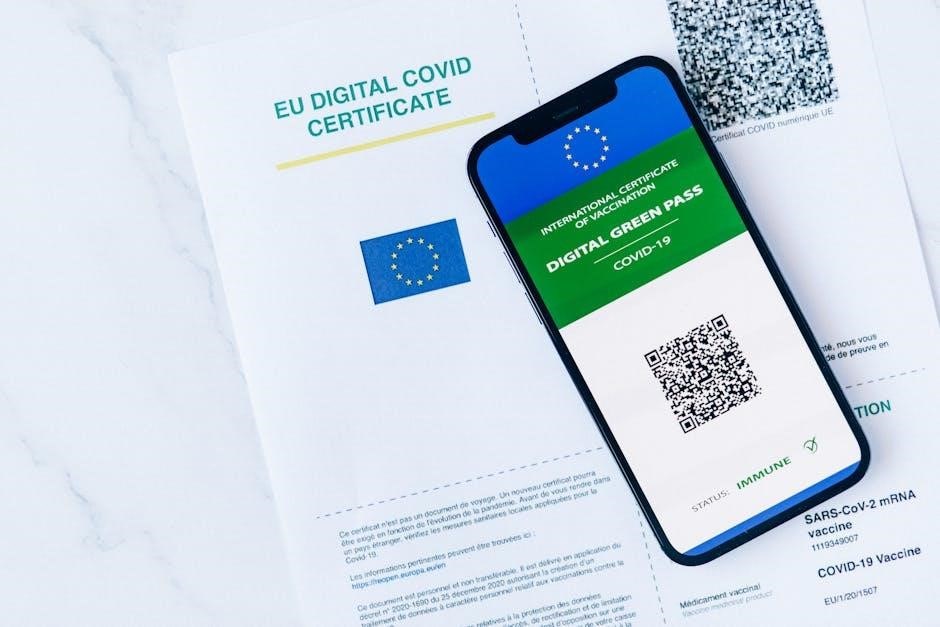The Hawaii Vaccine Exemption Form is a legal document enabling individuals to exempt their children from mandatory vaccinations due to medical, religious, or personal beliefs, as outlined by Hawaii state laws and administrative rules․
1․1 Overview of the Form’s Purpose
The Hawaii Vaccine Exemption Form is designed to allow parents or guardians to legally opt-out of mandatory vaccinations for their children․ It serves as a formal request to exempt a child from immunization requirements due to medical, religious, or personal belief reasons․ The form is grounded in Hawaii state laws and administrative rules, ensuring compliance with legal standards․ It provides a structured process for submitting exemptions, enabling families to align their decisions with personal values or medical necessities while adhering to state regulations․ Understanding the form’s purpose is essential for navigating vaccination policies effectively․
1․2 Importance of the Exemption Process
The exemption process is crucial for ensuring that families in Hawaii can make informed decisions about their children’s health while complying with state laws․ It provides a legal framework for parents or guardians to opt out of vaccinations due to medical, religious, or personal beliefs․ This process respects individual rights while maintaining public health standards․ By following the exemption process, families can avoid potential legal or administrative issues, ensuring smooth enrollment in schools or childcare facilities․ Understanding the importance of this process is vital for navigating vaccination requirements effectively and responsibly․

Types of Vaccine Exemptions in Hawaii
Hawaii offers medical and religious exemptions for vaccinations․ Medical exemptions require certification from a healthcare provider, while religious exemptions are based on sincerely held beliefs, as per state laws․
2․1 Medical Exemptions
A medical exemption in Hawaii requires certification from a licensed healthcare provider, stating that vaccination would endanger the child’s health due to medical conditions․ This exemption is strictly based on health risks, such as allergies or immune disorders, and must be documented on the Hawaii Vaccine Exemption Form; The provider must detail the specific medical reason for the exemption, ensuring it aligns with accepted medical standards․ Parents or guardians must submit this form to the school or healthcare facility, and it may require periodic renewal to maintain the exemption status․
2․2 Religious Exemptions
A religious exemption in Hawaii allows parents or guardians to exempt their child from vaccinations based on sincere religious beliefs opposing immunization․ The Hawaii Vaccine Exemption Form requires a written statement affirming these beliefs, which must be submitted to the school or healthcare facility․ Unlike medical exemptions, religious exemptions do not require certification from a healthcare provider․ The request is typically processed at the child’s school, ensuring compliance with state laws while respecting the family’s religious convictions․ This option is available to those who object to vaccines on deeply held spiritual or faith-based grounds․ The exemption must be submitted annually or as required by the institution․
2․3 Personal Belief Exemptions
A personal belief exemption in Hawaii allows parents or guardians to exempt their child from vaccinations based on personal, philosophical, or conscientious objections․ While Hawaii primarily recognizes medical and religious exemptions, some families may pursue this option due to deeply held beliefs about health and wellness․ The Hawaii Vaccine Exemption Form requires a written declaration outlining the reasons for the exemption․ This option is less commonly used compared to religious exemptions but provides an additional avenue for families to make informed health choices for their children, ensuring their rights are respected while balancing public health concerns․

Obtaining the Hawaii Vaccine Exemption Form
The Hawaii Vaccine Exemption Form can be downloaded as a PDF from official state health websites or obtained from schools․ It is essential for legally requesting exemptions based on medical, religious, or personal beliefs․
3․1 Downloading the Form
The Hawaii Vaccine Exemption Form is readily available for download as a PDF from the official Hawaii Department of Health website․ Additionally, it can be accessed through various educational institutions and health resources․ The form is designed to be user-friendly, allowing parents and guardians to fill it out electronically or print it for manual completion․ Ensure the form is downloaded from a credible source to avoid errors or outdated versions․ The PDF format ensures compatibility across devices, making it accessible for all users․ This step is the first in the process of legally requesting a vaccine exemption for children in Hawaii․
3․2 Instructions for Completing the Form
To complete the Hawaii Vaccine Exemption Form, carefully follow the step-by-step instructions provided on the document․ Section 1 requires detailed information about the parent/guardian and the child, including names, dates of birth, and contact details․ Section 2 must be filled out by a licensed physician for medical exemptions, stating the specific reasons vaccination would endanger the child’s health․ For religious exemptions, a signed affidavit is required․ Ensure all fields are filled accurately and the form is signed and dated․ Refer to the official guidelines on the form for specific instructions to avoid errors․
3․3 Required Documentation
Completing the Hawaii Vaccine Exemption Form requires specific documentation based on the type of exemption sought․ For medical exemptions, a licensed physician must certify that vaccination would endanger the child’s health․ This certification must detail the medical condition and its implications․ For religious exemptions, parents or guardians must complete and sign the form, affirming their religious beliefs․ Additional documentation, such as a letter from a religious leader, may be requested․ Ensure all sections are accurately filled and supporting documents are attached to avoid delays in processing․ Proper documentation ensures compliance with state regulations and facilitates approval․

Submission Process
The completed form must be submitted via fax to (808) 586-7511 or mailed to the Hawaii Department of Health, Immunization Branch, P․O․ Box 3378, Honolulu, HI 96801․ Required documents include EPI 12A or EPI 12B forms for school entry․
4․1 Where to Submit the Form
The completed Hawaii Vaccine Exemption Form must be submitted to the appropriate authorities․ Submissions can be made via fax to (808) 586-7511 or mailed to the Hawaii Department of Health, Immunization Branch, located at P․O․ Box 3378, Honolulu, HI 96801․ Additionally, the form can be submitted to the school or childcare facility where the child is enrolled․ Ensure all required documents, such as EPI 12A or EPI 12B forms, are included to avoid delays in processing․ Proper submission ensures compliance with state regulations and facilitates the exemption process effectively․
4․2 Required Accompanying Documents
The Hawaii Vaccine Exemption Form must be accompanied by specific documents, such as EPI 12A and EPI 12B forms, which detail immunization data․ These forms are submitted annually by schools to the Hawaii Department of Health․ Additionally, a completed original form should be given to the parent or guardian, while a copy is sent to the Department of Health via fax or mail․ The fax number is (808) 586-7511, and the mailing address is P․O․ Box 3378, Honolulu, HI 96801․ It is essential to ensure all documents are accurately completed and submitted to avoid processing delays․ Keeping copies of all submitted documents is recommended for personal records and verification purposes․

Eligibility Criteria for Exemptions
Eligibility for vaccine exemptions in Hawaii requires meeting specific criteria, such as medical contraindications, religious beliefs, or personal convictions․ Proper documentation, including forms like EPI 7 and EPI 7B, must accompany requests․
5․1 Who Can Apply
Eligibility for vaccine exemptions in Hawaii is reserved for parents, guardians, or students aged 18 or older․ Applicants must submit formal requests citing medical, religious, or personal belief reasons․ Medical exemptions require certification from a licensed healthcare provider, while religious exemptions involve completing specific forms, such as the EPI 7B․ Personal belief exemptions may require additional documentation․ The process ensures that all requests are reviewed thoroughly, with proper forms like the Hawaii Vaccine Exemption Form (EPI 7) and supporting documents submitted to the relevant authorities․ This framework protects individual rights while maintaining public health standards․
5․2 Age Requirements
The Hawaii Vaccine Exemption Form applies to children of all ages enrolled in schools or childcare facilities․ Immunization requirements vary based on age and grade, with specific vaccines mandated for kindergarten and seventh-grade entry․ Students entering school in Hawaii for the first time, regardless of age, must meet these requirements unless exempt․ The exemption process ensures compliance with state health regulations while accommodating eligible requests․ Proper documentation, such as the EPI 7 form, must be submitted to validate exemptions․ This structured approach helps maintain public health standards while respecting individual circumstances․
5․3 Qualifying Medical Conditions
Qualifying medical conditions for vaccine exemptions in Hawaii require certification from a licensed physician․ The exemption is granted if vaccination would endanger the child’s health or life due to a medical contraindication․ Conditions must be supported by documentation, ensuring the exemption is medically valid․ This process protects children with legitimate health risks while maintaining public health standards․ The form must be completed by a healthcare provider, confirming the medical basis for the exemption․ This ensures that exemptions are based on genuine health concerns and are thoroughly reviewed by medical professionals․

Legal Aspects of Vaccine Exemptions
The Hawaii Vaccine Exemption Form is governed by Hawaii Revised Statutes and Administrative Rules, ensuring compliance with state laws․ Accurate completion is required to avoid legal repercussions․
6․1 Hawaii State Laws
Hawaii State Laws govern vaccine exemptions through Hawaii Revised Statutes and Administrative Rules, ensuring exemptions are legally valid․ These laws outline the conditions under which medical or religious exemptions can be granted․ For medical exemptions, a licensed physician must certify that vaccination would endanger the child’s health․ Religious exemptions require a written statement from the parent or guardian expressing sincere religious beliefs opposing vaccination․ Hawaii law does not permit personal belief exemptions, emphasizing public health protection․ Compliance with these legal standards ensures the exemption process aligns with state health regulations and maintains the integrity of public health systems․
6․2 Role of Healthcare Providers
Healthcare providers play a critical role in the vaccine exemption process, particularly for medical exemptions․ They must evaluate the child’s health and certify in writing that vaccination would endanger the child’s life or health․ This certification is required for the exemption to be legally valid․ Additionally, healthcare providers are responsible for educating parents or guardians about the risks and benefits of vaccines, ensuring informed decision-making․ Their professional judgment is essential to maintaining the integrity of the exemption process while safeguarding public health․ Compliance with state laws and medical ethics is a key component of their role in this process․
6․3 Legal Implications of False Statements
Submitting false statements on the Hawaii Vaccine Exemption Form can lead to serious legal consequences․ Under Hawaii state laws, falsifying information on official documents, including vaccine exemption forms, is considered a criminal offense․ Individuals who intentionally provide misleading or untrue information may face criminal charges, including fines and potential felony penalties․ Additionally, civil penalties may apply, such as the loss of exemption privileges․ The legal system emphasizes the importance of honesty to maintain the integrity of the exemption process and protect public health interests․

Impact of Exemptions on Public Health
Vaccine exemptions in Hawaii have raised concerns about herd immunity, as rising exemption rates may increase the risk of disease outbreaks, despite most children being vaccinated․
7․1 Current Exemption Rates
Hawaii has seen a notable increase in vaccine exemption rates, with recent data indicating a rise to 6․4%, nearly double the previous year․ This trend reflects growing personal belief and religious exemptions․ While the majority of students remain vaccinated, the upward shift in exemptions has public health implications․ Schools with higher exemption rates are closely monitored to assess potential risks to herd immunity․ Despite this, most children in Hawaii still meet vaccination requirements, maintaining robust community protection against preventable diseases․
7․2 Effects on Herd Immunity
The rise in vaccine exemptions in Hawaii has raised concerns about herd immunity, which protects vulnerable populations from preventable diseases․ Lower vaccination rates can reduce this collective protection, increasing the risk of disease outbreaks․ Even a small decline in immunization rates can significantly impact public health, particularly for individuals with compromised immune systems․ For example, measles outbreaks have historically occurred in areas with lower vaccination coverage․ Schools with higher exemption rates are closely monitored to mitigate potential risks․ Maintaining high vaccination rates is crucial to preserving herd immunity and safeguarding community health․
7․3 School Policies on Exempt Students
Hawaii schools require students with vaccine exemptions to provide proper documentation, such as the Hawaii Vaccine Exemption Form, to ensure compliance with state regulations․ Schools monitor exemption rates and may implement additional health protocols during disease outbreaks to protect both exempt and vaccinated students․ While exempt students are allowed to attend school, their participation in certain activities may be restricted if a public health risk is identified․ Schools strive to balance individual rights with community health, ensuring a safe environment for all students․ This approach reflects Hawaii’s commitment to maintaining public health while respecting personal and religious beliefs․

Required Immunizations and Exemptions
The Hawaii Vaccine Exemption Form allows parents to exempt their children from required vaccinations for medical, religious, or personal reasons, as outlined by Hawaii state laws․
8․1 Immunization Requirements
In Hawaii, specific immunizations are mandated for school entry, ensuring public health safety․ Required vaccines include DTaP (diphtheria, tetanus, pertussis), MMR (measles, mumps, rubella), polio, Hepatitis B, and others․ These vaccinations protect against preventable diseases and are crucial for herd immunity․ The Hawaii Department of Health outlines age- and grade-specific requirements, with exemptions allowed for medical or religious reasons․ Documentation must be submitted to schools or childcare facilities․ Additionally, COVID-19 vaccination certificates may be required for travelers․ Compliance with these requirements is essential for school enrollment and community health protection․
8․2 Exemption Effects on School Entry
The Hawaii Vaccine Exemption Form allows children to enroll in school without meeting vaccination requirements under medical or religious grounds․ Schools require the submission of this form to process exemptions, ensuring compliance with state laws․ Medical exemptions must be certified by a licensed physician, while religious exemptions are typically completed at the school․ Personal belief exemptions are not recognized in Hawaii․ The form must be submitted annually, and schools may request additional documentation to verify the exemption’s validity․ This process ensures that all students, including those exempt, can access education while maintaining public health standards․

Comparing Hawaii’s Policies to Other States
Hawaii only allows medical and religious exemptions, unlike some states that permit personal belief exemptions, making its policies stricter and more aligned with public health priorities․
9․1 National vs․ Hawaii Exemption Laws
Hawaii’s vaccine exemption laws are more restrictive compared to some U․S․ states․ While many states allow medical, religious, and personal belief exemptions, Hawaii only permits medical and religious exemptions․ This aligns with the state’s strong public health focus․ Nationally, exemption policies vary widely, with some states offering broader exemptions, impacting vaccination rates and public health outcomes․ Hawaii requires strict documentation for exemptions, ensuring compliance with state health regulations․ This approach reflects the state’s commitment to maintaining high vaccination levels and protecting community immunity․

COVID-19 Specific Exemption Policies
Hawaii implemented specific policies for COVID-19 vaccine exemptions, allowing medical or religious exemptions with proper documentation․ Temporary measures were introduced to address pandemic-related vaccination requirements while ensuring public health safety․
10․1 Temporary Policies During the Pandemic
During the COVID-19 pandemic, Hawaii introduced temporary policies to address vaccine exemptions for the coronavirus vaccine․ These policies allowed individuals to request exemptions based on medical or religious grounds, similar to existing vaccine exemption processes․ Temporary measures included requiring a COVID-19 vaccination certificate or a negative test for unvaccinated individuals entering the state․ Specific forms, such as the EPI 7B, were used to document religious or medical exemptions for COVID-19 vaccines․ These policies aimed to balance public health safety with individual rights, ensuring compliance with state laws while managing pandemic-related risks․
Resources for Parents and Guardians
Parents can access the Hawaii Vaccine Exemption Form and related resources through the official state website․ Download links for the EPI 7B form and support organizations are provided for convenience․
11․1 Download Links for the Form
The Hawaii Vaccine Exemption Form can be downloaded from the official Hawaii Department of Health website․ The form, designated as EPI 7B, is available in PDF format for easy access․ Parents and guardians can visit the Hawaii Immunization Program page to find the downloadable link․ Additionally, schools and healthcare providers often provide copies of the form or direct individuals to the official website․ The form includes sections for medical exemptions, religious exemptions, and personal belief exemptions, ensuring compliance with state regulations․ Properly completed forms must be submitted to the appropriate authorities for review and approval․
11․2 Support Organizations
Several organizations provide support and resources for parents seeking vaccine exemptions in Hawaii․ The Hawaii Department of Health offers guidance through its Immunization Branch, ensuring families understand the exemption process․ Local schools often assist by providing exemption forms and explaining the submission process․ Additionally, nonprofit organizations focused on vaccine education may offer resources and legal guidance for those pursuing exemptions․ These organizations help ensure that parents are well-informed and supported throughout the exemption process, adhering to Hawaii’s legal and health requirements․
The Hawaii Vaccine Exemption Form provides a legal pathway for parents to exempt their children from vaccinations based on medical, religious, or personal beliefs, adhering to state laws․
12․1 Summary of Key Points
The Hawaii Vaccine Exemption Form allows parents or guardians to legally exempt their children from required vaccinations due to medical, religious, or personal beliefs․ It is grounded in Hawaii state laws and administrative rules, ensuring compliance with legal standards․ The form outlines the conditions for exemptions and requires proper documentation, such as medical certification or religious affidavits․ Submission involves providing the completed form to schools or healthcare authorities, with penalties for false statements․ Parents must understand the implications of exemptions on public health and school entry․ Resources like downloadable forms and support organizations aid in navigating the process․
Appendix
This section provides downloadable forms and references for the Hawaii Vaccine Exemption Form, including EPI 12A, EPI 12B, and religious exemption documents․ Visit the Hawaii Department of Health website or specific school links for detailed resources and submission guidelines․ Forms are available as PDFs for easy access and completion․ Ensure to review all provided materials carefully before submission to avoid delays or rejection․ Contact the Department of Health at P․O․ Box 3378, Honolulu, HI 96801, for additional assistance․
13․1 Downloadable Forms
The Hawaii Vaccine Exemption Form and related documents are available for download as PDFs from the Hawaii Department of Health website․ Forms include EPI 12A and EPI 12B, which are used for reporting immunization exemptions․ Additionally, the religious exemption form (EPI 7B) and medical exemption forms can be accessed online․ These documents are designed to be fillable, allowing users to complete them electronically before printing․ Visit the official Hawaii Department of Health website or specific school links to download the latest versions of these forms․ Ensure all sections are completed accurately to avoid delays in processing․
13․2 References and Further Reading
For additional information, refer to the Hawaii Department of Health website, which provides detailed resources on vaccine exemptions․ The Hawaii Revised Statutes (302A-1156, 325-34) and Hawaii Administrative Rules (11-157-5) outline legal frameworks for exemptions․ Downloadable forms, such as EPI 12A and EPI 12B, are available on the DOH website․ The Immunization Branch offers guides for completing exemption forms․ Visit immunization․doh․hawaii․gov for official documents and resources․ These materials ensure compliance with state requirements and provide clarity on exemption processes․




Leave a Reply
You must be logged in to post a comment.